NEW DELHI: In a landmark verdict, the decision came during the hearing of a petition filed by the Punjab government. Chief Justice DY Chandrachud, along with Justices JB Pardiwala and Manoj Mishra, emphasized the constitutional validity of Punjab Vidhan Sabha sessions on June 19, June 20, and October 20 this year.
The detailed judgment was uploaded on Thursday, stating that “The Governor, as an unelected Head of the State, is entrusted with certain constitutional powers. However, this power cannot be used to thwart the normal course of lawmaking by the State Legislatures.”
Regarding the withholding of assent under Article 200, the court ruled that if the Governor chooses this course, the logical action is to remit the Bill to the state legislature for reconsideration. Casting doubt on the validity of the House session is not a constitutional option, the court asserted.
READ MORE: Election Commission puts curbs on Congress ads airing CM’s voice
The Supreme Court directed the Governor of Punjab to decide on the Bills submitted for assent, recognizing the constitutionally valid sessions on June 19, 2023, June 20, 2023, and October 20, 2023.
Furthermore, the court clarified that a state Governor cannot misuse constitutional powers to obstruct legislative bills. “The Governor, as a guiding statesman, may recommend reconsideration or amendments. However, the ultimate decision belongs to the legislature alone,” emphasized the court.
READ MORE: Rajouri encounter update: 2 LeT terrorists neutralised, 5 soldiers martyred
“The Governor, as a guiding statesman, may recommend reconsideration of the entirety of the Bill or any part thereof and even indicate the desirability of introducing amendments. However, the ultimate decision on whether or not to accept the advice of the Governor as contained in the message belongs to the legislature alone,” the court underlined.










